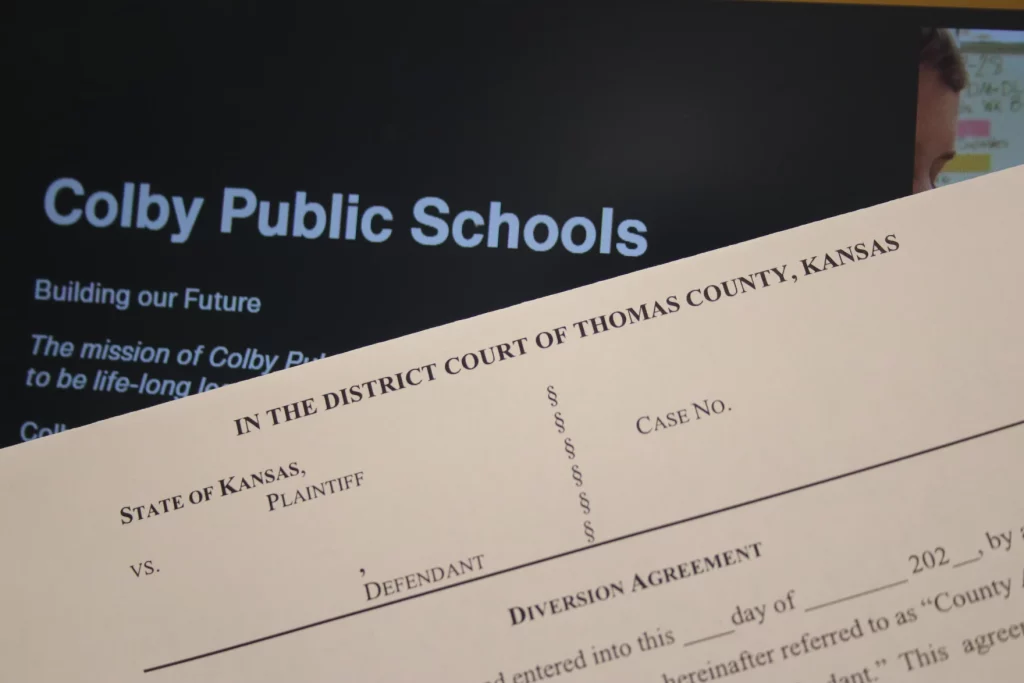Topeka, KS— Diversion agreements keep criminal charges off someone’s record and even spare them jail time — assuming they can afford the cost of diversion.
A DUI diversion in Thomas County in northwest Kansas has a $750 fine and $158 of court costs tacked on, but the county adds an additional, mostly unheard of, clause: a donation to the Colby Public Schools’ after-school program.
That donation is spelled out in black and white in the diversion agreement. The USD 315 After School Program netted $5,850 from 26 people in 2022. Most people were under court orders to pay about $200.
“I just don’t think that was how diversion was intended,” said Rep. Stephen Owens in December. Owens is the Republican chair of the House Corrections and Juvenile Justice committee.
Donation clauses in diversion are technically allowed in state law, but Owens said he is taking a look at the program.
Christopher Rohr, the county attorney in Thomas County, sets the rules for his diversion program. He said he would review his policy to see if changes were needed.
Rohr didn’t respond to questions asking if anyone was ever sent to jail because they couldn’t afford the donation.
Even with lawmakers possibly stepping in, the language in Thomas County underscores a concern that diversion is too costly and keeps people from getting the help they need.
Jessica Glendening, the chief public defender in Shawnee County, said the clause in Thomas County is unusual. But Glendening has worked in legal defense for decades and said diversion regularly comes with clauses that can hurt low-income Kansans.
While Thomas County has donations to public school programs, other counties created fines specifically to fund violence prevention programs. She’s heard some counties require money seized from an arrest be forfeited to law enforcement, sometimes costing people thousands of dollars. Other times, diversion fees can run up to $10,000.
She wants diversion to be run by the courts so the state would have a consistent approach. Currently, each county can set the terms of its diversion agreements.
“Diversion is supposed to be a shot at redemption and atonement and reducing recidivism,” she said, “and the goal should be closely tied to those things.”
Diversion keeps criminal charges off someone’s record by agreeing to a list of alternative punishments. They can be fines for the offense, covering court fees created by the offense or going through treatment programs.
For a DUI, that could be teaching someone how to manage their alcohol consumption. Diversion could also require an apology note to the victim. Whatever the program, Glendening and others say it needs to focus less on monetary punishment and more on rehabilitation.
“The ability to pay money is not a true form of accountability or real ties to behavior shifts or learning opportunities,” said Priya Sarathy Jones, deputy executive director of the Fines and Fees Justice Center.
Sarathy Jones said fines and fees don’t dole out punishment fairly. Wealthier offenders might not even notice a fine. To others, it could mean missing meals.
KCUR reported in October that diversion can cost individuals hundreds of dollars, but make only a minor fraction of a city or county’s budget. That led to concerns that it created a two-tiered system of justice — one for people who can afford the cost without much pain, and a more onerous one for poor people..
Sarathy Jones said that punishing someone monetarily — like through a donation — doesn’t make them less likely to re-offend. She wants counties and cities to do away with fees because diversion and court systems are key functions of the government, and she said they should be funded by everyone.
“It is shockingly low what can derail a person’s day-to-day life from a financial standpoint,” she said.
Blaise Mesa reports on criminal justice and social services for the Kansas News Service in Topeka. You can follow him on Twitter @Blaise_Mesa or email him at blaise@kcur.org.
The Kansas News Service is a collaboration of KCUR, Kansas Public Radio, KMUW and High Plains Public Radio focused on health, the social determinants of health and their connection to public policy.
Kansas News Service stories and photos may be republished by news media at no cost with proper attribution and a link to ksnewsservice.org.













